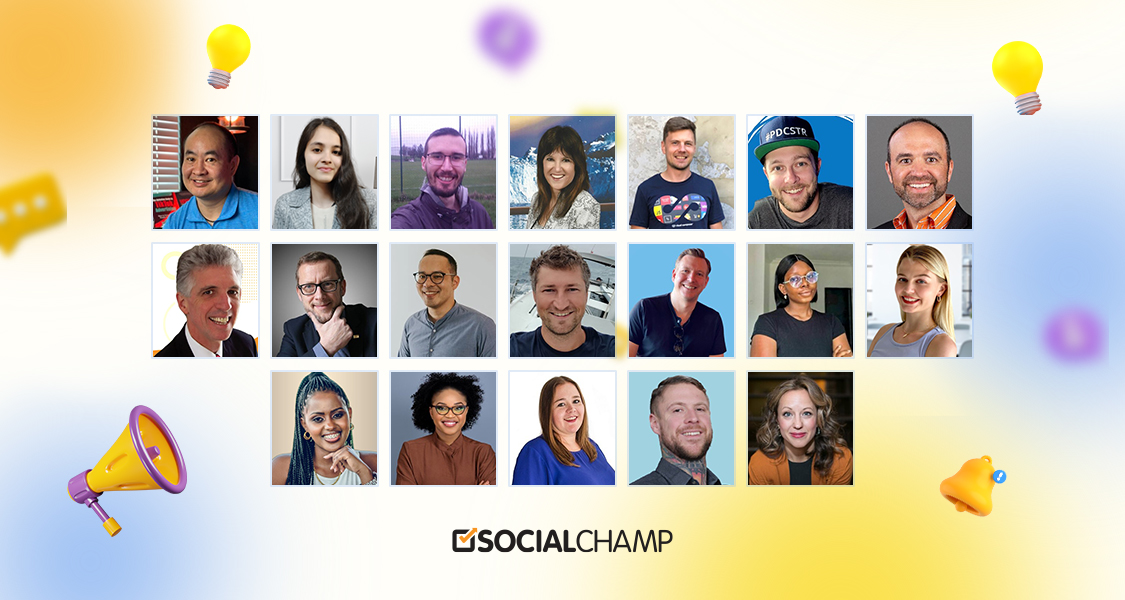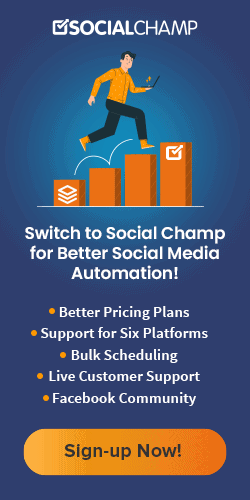Over the years we’ve interviewed several industry professionals, each a master of their own craft. Here, we’ve compiled some of their thoughts and wisdom to share with our invaluable audience.
To read complete interviews, click their names to be redirected to the respective interview.
————
“I believe that training programs and mentorship are replacing traditional education. And that this hands-on experience has to come from industry participants like Social Champ who are in the thick of it– not from just academia.
We need to bridge the education system and private sector. And that means we set industry-wide standards in digital marketing that tie to certification programs for our young and not-so-young adults.”
– Dennis Yu on evolving educational standards
————
“Build Omnipresence– It means that whether you want to start a blog or YouTube, you need to be present everywhere. As competition has increased, it’s essential to be present everywhere.
Give First then Ask– This is my core value that I always used to follow on my social media platforms. If you follow me on Instagram or YouTube, you will automatically get what I want to say. I always try to give the best possible values I can provide to my audience, and then only I ask them to follow me or subscribe to my YouTube channel.”
– Nancy Misra on Personal Branding
————
“My advice is simple: first, you need to determine your brand’s USP (unique selling proposition). What is it that makes you unique in your niche? What are you bringing to the table? Then you need to research a set of keywords searched by your ideal customer. And then you must go hard with content marketing. 90% of your content needs to target questions people ask about this and that in your niche. Ranking for those will present you as an authoritative, but also helpful and caring brand. 10% of the content produced needs to be linkable asset content.”
– Nikola Roza on starting out in content marketing
————
“I would start with organic methods of growing on social media. Don’t pay for paid ads. Start promoting your blog content on mainstream social media sites. Include Quora that allows you to include a relevant link in your answers. After a month, check Google Analytics to see where your blog traffic is coming from. Continue to promote at the Top 3 places. When I was new, Facebook groups helped my growth enormously. These groups allow daily and weekly promotion. Some of them have tens of thousands of members. That is tremendous exposure for free. Here you will find the groups.”
– Janice Wald on starting out on social media
————
“I’m always competing with myself. It is the best source of motivation to see that you are doing something better than yesterday or a month ago. I love experiments, and as a result, I break things. Which provides me with the new data for the next experiment 🙂
Another thing that motivates me is the people that I work with. I am so grateful to have such a great team. I love hearing from members who just joined and were blown away by the climate at our company, nothing like what they had seen before. In an environment like this, people flourish and bring their ‘A-game, sharing the knowledge and seeing how they grow such a privilege.”
– Michael Makinjenko on personal motivation
————
“I do agree that podcasting can be a great way to grow a B2B business. If the pandemic has taught us anything, it’s that people want to relate to the PEOPLE behind the brand, not the logo. That goes for consumers as well as other brands.
Podcasting allows you to build trust with anyone who listens because they can hear YOUR voice speaking to them on the other side. Inherently, you feel a stronger connection with someone when you can hear or see them vs passing email back and forth.
Think about it, are you more likely to do business with someone you already know (even in a limited capacity) or someone who sends you an email out of the blue?”
– Nick Nalbach on Podcasting
————
“Every content marketing initiative has a reason to exist. Hopefully, that’s based on a sound business goal. Since it’s marketing, we need to identify our hypothesis, or what type of behavior change we are trying to see with our audience. From there, the best method is to create one amazing thing – a newsletter, a podcast, an event…that delivers valuable and relevant content to your audience over time. If the program is working, you’ll start to see that behavior change.”
– Joe Pulizzi on business goals
————
“Automation is essential. Marketing sophistication is much deeper today, and it’s not enough to be on one social channel. Manually distributing content on multiple channels is too costly and tedious.
However, the personal touch should never be left out. Rely on automation to distribute the content. Then rely on humans to engage with comments, likes, and shares.
And as with everything else in marketing, it should be driven by strategy. A plan needs to be in place before the automation starts.”
– Andre Palko on marketing automation
————
“Things change fast and sometimes dramatically in social media. As a digital marketer, you need to stay up to date on what is happening. You need to assess new platforms and new features quickly, to see if you need to learn about them and use them for your clients. All of you have seen the rapid rise of Instagram (and Instagram influencers), followed by an even faster rise of TikTok. You need to understand the essence of those tools and assess if they are relevant for your business.
If your B2C company serves 10 to 25 year-olds for example, you have to be on TikTok. But if you are a B2B satellite manufacturer, perhaps LinkedIn and Twitter are better.”
– Remco Timmermans on staying ahead of the curve with Social Media
————
“We’ve done very limited advertising, almost zero, and focused on building great content. That’s because podcasts are growing in popularity and the pandemic was a catalyst for the platform as a whole.
However, what we did that worked really well was explore social platforms and through trial and error figure out how to ‘hack’ into that community. One of our newest and fastest-growing platforms has been TikTok with some of our videos getting thousands of views and we’re just getting started right now. In fact, check us out on any of the platforms by searching ‘business over drinks’ and we pop up first.”
– Terng Shing Chen on growth hacking
————
“I want to tell anybody out there that’s thinking of starting a business just to do it. There’s never been a better time to start your own business, and the tech stack available to help you do this is out of this world. Maybe you’re a technical person like me; there are a bunch of tools out there that can take a lot of responsibility when it comes to the different aspects of your business that you’re less strong in dealing with.
You don’t need a big fancy office, a suit, and tie, or a massive injection of cash anymore to start your business. You need a laptop and a pair of comfy slippers.
Do it, do it, do it!”
– Andrei Petrik on starting a business
————
“Marketing is everything in promoting SaaS Products. But perhaps even more important is to focus on your customer and truly solve their pain point. Building a SaaS is easy in theory:
- Find out what to build by talking to potential customers
- Build it
- Tell Your customers about it and gather their feedback
The problem is the devil is in the details.”
– Timothy Bramlett on SaaS marketing
————
“For me, I would say the importance of a community is underrated. It’s safe to say thank God for the Pandemic, which has opened the eyes of many organizations to the importance of a Community. A Community gives a sense of belonging and values. Being in a community bonded with values, goals, and good attitudes is essential in building and sustaining any product.
So for a newbie that wants to start their own community, I’d advise you to cross your ‘t’ and dot your ‘i’. What do I mean by this? Know your values because the community is about Trust. You have a value you want to give to your audience, they see this value and trust you to deliver, and they join your community and invite others. The best three things to do are:
Define your goals and Strategies.
How do you want to measure your success?
Lastly, know your target audience and how to get them.”
– Atinuke Bami on the importance of community
————
“Listen to customer feedback and go from there. Also: stop building features and do marketing instead!! Chances are, you’re going to get caught up in coming up with all those new, fancy features that nobody asked for when you should really market your existing features to attract new customers and increase your MRR.
Another massively underrated tip is to focus on your personal brand just as much and use your existing community to get early users and feedback.
Choose one channel and go heavy on that – after that, building up your SaaS will become much easier.”
– Svenja Rossig’s advice for SaaS startups
————
“The creator community is stronger than ever, and it will get stronger. There isn’t a single campaign that you can plan nowadays without including content creators. Working with creators has the advantage that they already know what to do and have a relevant audience to target with your message. According to Influencer Marketing Hub, 50 million people worldwide will consider themselves creators in the near future, confirming the creator economy’s huge potential.”
– Joy Akatukunda on working with content creators
————
“To be successful in business today, you need to be flexible and have good planning and organizational skills. Many people start a business with the idea of making money by turning on a computer or opening a door, but they find that making money from their business is much more difficult than they think.
My advice would be: providing good service to your customers is crucial to gaining their loyalty and retaining their business, don’t do it for you, do it for them and lastly, build your brand on social media, it’s the best place to meet your customers and sweep them off their feet.”
– Janet Machuka on success in business
————
“The SEO community in particular has been so valuable for me over the years. I learned so much from others on social media, in groups, at conferences. And Twitter in particular gets a bit of a bad rap for some of the trolling and dramatics that go on. But despite some of that, I still get a lot of value in talking shop on social with other SEOs.
Communities like Women in Tech SEO (founded by the wonderful Areej Abuali) are also incredibly valuable. They’re incredible places to get genuinely excellent advice, make connections and friends.”
– Stacey MacNaught on the SEO community
————
“Always make your customer the hero. It’s never about you. Tell a story that pokes at the customer’s problem. This shows a flawed hero can overcome and conquer the problem with the product. Let testimonials be the foundation and guiding voice throughout the story.
Outline your stories with this simple structure:
- Setup
- Conflict
- Resolution
- Lesson/takeaway
Keep it simple, then build with details.”
– Parker Worth on storytelling
————
“Crafting the right tone is a nuanced process; there’s no one-size-fits-all tool. Stay engaged in communities you want to write for and recognize trends and conventions.
Another helpful resource is reading and studying screenplays and content created by writers you admire. Analyzing their writing style and tone and how they balance professionalism and creativity can be super helpful and inspirational. Finally, seek feedback.”
– Bekah Hawrot Weigel’s advice for aspiring writers
————














